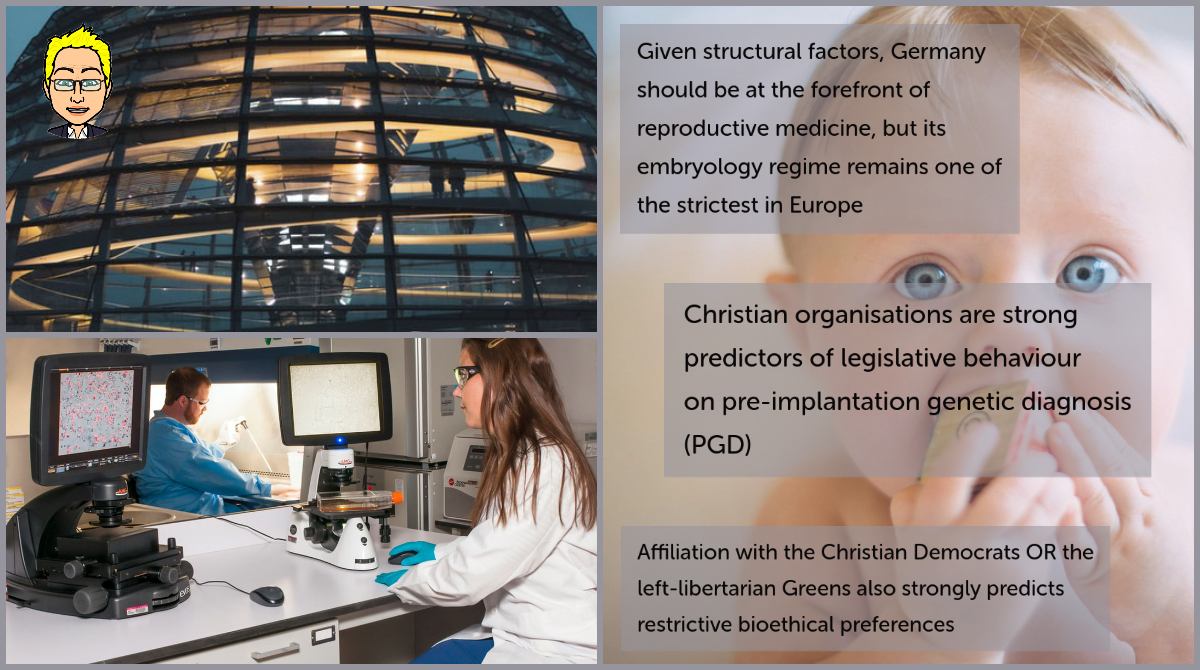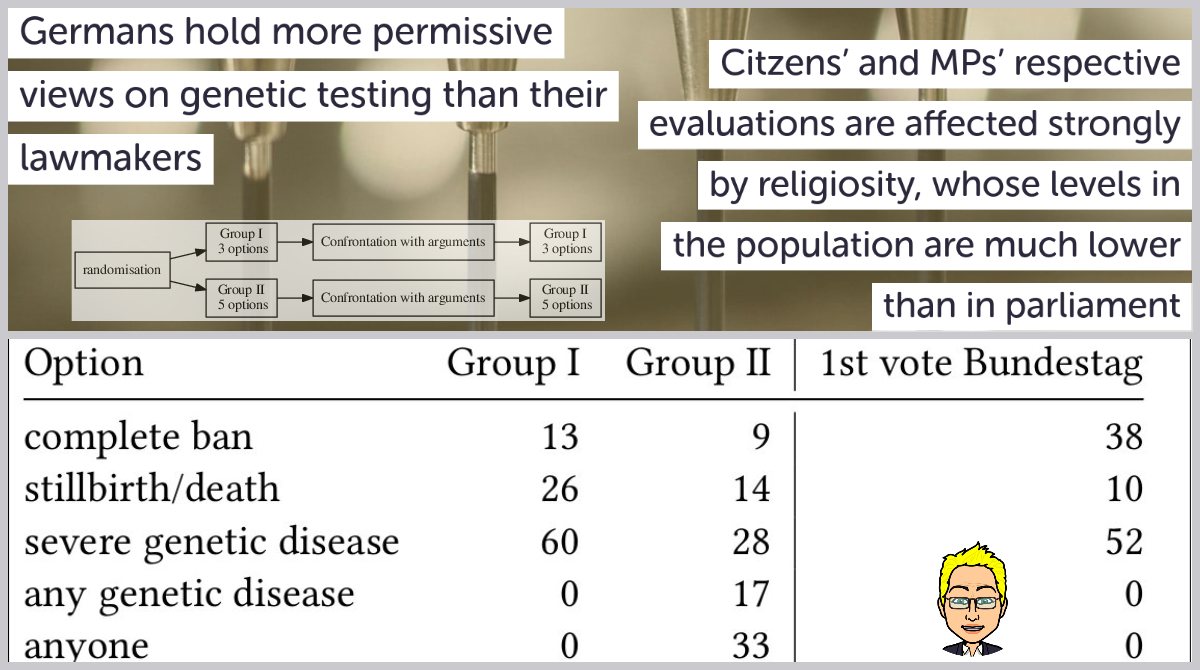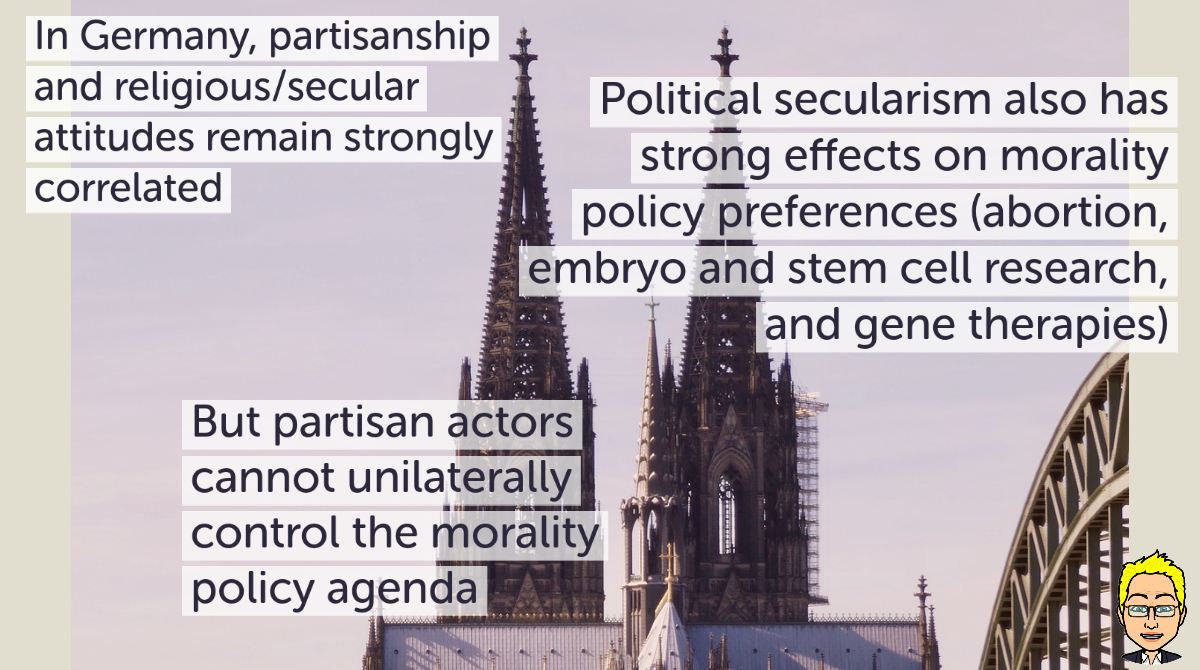I am very much interested in popular attitudes on bioethical issues. Bioethical issues are an (increasingly) important subgroup of so-called morality issues: political questions that are linked to conflict over deep-seated beliefs and values.
Parliamentary Votes on PGD
My interest in this field began with a puzzle: only under external pressure by the courts did Germany’s Bundestag lift the complete ban on pre-implantation genetic diagnosis, a technique that identifies healthy embryos during IVF. The new rules are still fairly restrictive but could only be passed by a bare cross-partisan majority. Conversely, large segments of the German public seemed to support the new rules. I collected data on individual MPs and tried to identify the determinants of their voting behaviour. My analysis shows that a surprisingly large number of them was involved with religious organisations. Unsurprisingly, this is a strong predictor of voting against the new rules. Moreover, partisanship matters although the vote was free. Controlling for other factors, both Christian Democrats and the Greens were more opposed to the new law than other MPs. This is the fabled blue-green issue coalition. The results were published as an open access article in Research and Politics.
- Arzheimer, Kai. “Strange Bedfellows: The Bundestag’s Free Vote on Pre-Implantation Genetic Diagnosis (PGD) Reveals How Germany’s Restrictive Bioethics Legislation is Shaped by a Christian Democratic/New Left Issue-Coalition.” Research and Politics 2.3 (2015): 1–7. doi:10.1177/2053168015601130
[BibTeX] [Download PDF] [HTML] [DATA]@Article{arzheimer-2015d, author = {Arzheimer, Kai}, title = {Strange Bedfellows: The Bundestag's Free Vote on Pre-Implantation Genetic Diagnosis (PGD) Reveals How Germany's Restrictive Bioethics Legislation is Shaped by a Christian Democratic/New Left Issue-Coalition}, journal = {Research and Politics}, year = 2015, doi = {10.1177/2053168015601130}, html = {https://rap.sagepub.com/content/2/3/2053168015601130}, url = {https://rap.sagepub.com/content/2/3/2053168015601130.full.pdf}, data = {https://hdl.handle.net/10.7910/DVN/KG38OG}, pages = {1--7}, number = {3}, volume = {2} }
Citizens’s Views on Genetic Testing (PGD)
I found this so intriguing that I wanted to know more about how ordinary people think about these issues, so I conducted (with the generous support of Germany’s National Science Foundation) a representative population survey. The survey had a large experimental component: about 1000 respondents could chose from the three options debated in parliament, while another 1000 respondents had two additional choices modelled after the (much) more permissive laws in Belgium and the UK. Participants were then confronted with 16 arguments raised during the plenary debate. Finally, they had to chose again.
Citizens turned out to be much more permissive than their MPs. Hearing what their representatives had to say did not change this at all. Arguments in favour of PGD were widely accepted, arguments against PGD were mostly rejected. The underlying reason are that levels of religiosity are far lower than in parliament, whereas secular views are widespread. This has consequences beyond the specific issue of PGD. The article (which does discuss these consequences and much more) appears as open access in Political Research Exchange. Replication data are freely available.
- Arzheimer, Kai. “Secular Citizens, Pious MPs: Why German Attitudes About Genetic Testing Are Much More Permissive Than German Laws.” Political Research Exchange 2.1 (2020). doi:10.1080/2474736X.2020.1765693
[BibTeX] [Abstract] [Download PDF] [HTML] [DATA]Germany has lifted its total ban on Preimplantation Genetic Diagnosis (PGD, a form of genetic testing), but the new rules are still much stricter than those in other European countries. Results from a large-scale survey experiment show that the general population holds more permissive views on this bio-ethical question than lawmakers. In a country seen as a paradigm for the “religious world” of morality politics, many citizens even support further liberalisation along the lines of legislation in Belgium and the UK. Induced reflection on the arguments raised in parliament does not change this: arguments in favour of PGD are widely accepted by respondents, whereas many citizens reject the arguments against PGD. Citzens’ and MPs’ respective evaluations are affected strongly by religiosity, whose levels in the population are much lower than in parliament. Widespread secular views are not adequately represented in politics. This does not only concern the regulation of PGD but also other current and future bioethical issues. It is unlikely that this tension can be resolved through electoral politics. These findings have important ramifications not just for practical morality politics in Germany and other “religious world” countries but also for the two worlds framework itself.
@Article{arzheimer-2020b, author = {Arzheimer, Kai}, title = {Secular Citizens, Pious MPs: Why German Attitudes About Genetic Testing Are Much More Permissive Than German Laws}, html = {https://www.tandfonline.com/doi/full/10.1080/2474736X.2020.1765693}, journal = {Political Research Exchange}, url = {https://www.tandfonline.com/doi/pdf/10.1080/2474736X.2020.1765693?needAccess=true}, year = 2020, volume = {2}, number = {1}, abstract = {Germany has lifted its total ban on Preimplantation Genetic Diagnosis (PGD, a form of genetic testing), but the new rules are still much stricter than those in other European countries. Results from a large-scale survey experiment show that the general population holds more permissive views on this bio-ethical question than lawmakers. In a country seen as a paradigm for the "religious world" of morality politics, many citizens even support further liberalisation along the lines of legislation in Belgium and the UK. Induced reflection on the arguments raised in parliament does not change this: arguments in favour of PGD are widely accepted by respondents, whereas many citizens reject the arguments against PGD. Citzens' and MPs' respective evaluations are affected strongly by religiosity, whose levels in the population are much lower than in parliament. Widespread secular views are not adequately represented in politics. This does not only concern the regulation of PGD but also other current and future bioethical issues. It is unlikely that this tension can be resolved through electoral politics. These findings have important ramifications not just for practical morality politics in Germany and other "religious world" countries but also for the two worlds framework itself.}, html = {https://www.tandfonline.com/doi/full/10.1080/2474736X.2020.1765693}, url = {https://www.tandfonline.com/doi/pdf/10.1080/2474736X.2020.1765693?needAccess=true}, data = {https://doi.org/10.7910/DVN/PY9TBQ}, doi = {10.1080/2474736X.2020.1765693}, dateadded = {28-03-2020} }
A micro-level test of the two-worlds theory
The most important comparative theory for explaining differences in morality policy making is the two-worlds framework championed by Engeli, Green-Pedersen & Larsen. As a cleavage theory, the two-worlds framework operates at the macro and meso-levels, but to be plausible, some relationships at the micro-level must hold. In a shorter article, I derive these (largely implicit) assumptions from the theory and test them using Structural Equation Modelling techniques. Relationships at the micro-level are compatible with the two-world framework, but the findings raise some new questions regarding the role of parties and religious actors in secularising societies. The full article appears as open access in Research & Politics. Replication scripts and data are freely available.
- Arzheimer, Kai. “A partial micro-foundation for the ‘two-worlds’ theory of morality policymaking: Evidence from Germany.” Research & Politics 7.2 (2020). doi:10.1177/2053168020917823
[BibTeX] [Abstract] [Download PDF] [HTML] [DATA]The two-worlds framework is currently the most important account of morality policymaking in Europe. For this theory of elite behaviour to be valid, a number of implicit assumptions about political belief systems at the mass level must hold. This contribution spells out these assumptions and tests them within a structural equation modelling framework, using original survey data from Germany, a country that constitutes a crucial case for the two-worlds theory. The results showed that the implicit individual-level preconditions of the two-worlds framework were fulfilled. Political secularism and partisanship were strongly associated. Political secularism also had strong effects on morality policy preferences regarding the preferred regulation of abortion, embryo and stem cell research, and gene therapies, even when controlling for a host of background variables. However, the size of the effects did not vary across politicised and non-politicised issues. This casts some doubt over the ability of partisan actors to unilaterally control the morality policy agenda.
@Article{arzheimer-2020c, author = {Kai Arzheimer}, title = {A partial micro-foundation for the 'two-worlds' theory of morality policymaking: Evidence from Germany}, journal = {Research \& Politics}, year = 2020, volume = 7, number = 2, abstract = {The two-worlds framework is currently the most important account of morality policymaking in Europe. For this theory of elite behaviour to be valid, a number of implicit assumptions about political belief systems at the mass level must hold. This contribution spells out these assumptions and tests them within a structural equation modelling framework, using original survey data from Germany, a country that constitutes a crucial case for the two-worlds theory. The results showed that the implicit individual-level preconditions of the two-worlds framework were fulfilled. Political secularism and partisanship were strongly associated. Political secularism also had strong effects on morality policy preferences regarding the preferred regulation of abortion, embryo and stem cell research, and gene therapies, even when controlling for a host of background variables. However, the size of the effects did not vary across politicised and non-politicised issues. This casts some doubt over the ability of partisan actors to unilaterally control the morality policy agenda.}, dateadded = {28-03-2020}, url = {https://journals.sagepub.com/doi/pdf/10.1177/2053168020917823}, data = {https://doi.org/10.7910/DVN/2MIWPN}, html = {https://journals.sagepub.com/doi/10.1177/2053168020917823}, keywords = {bioethik}, doi = {10.1177/2053168020917823} }
A Short Scale for Measuring Political Secularism
Political secularism is a new concept that plays an important role in the articles above. But how can we measure political secularism? In this short research note, I discuss the concept and present five items for its measurement. I then show that these items form a scale which meets formal criteria for validity and reliability.
- Arzheimer, Kai. “A short scale for measuring political secularism.” Politics and Religion 15.4 (2022): 827-840. doi:10.1017/S1755048322000104
[BibTeX] [Abstract] [Download PDF] [HTML] [DATA]As religiousness is declining across democracies, scientific interest in secular orientations and their political implications is growing. One specific and particularly important aspect of secular attitudes is political secularism. Political secularism is not merely the absence of religiousness, but rather a world view which holds that religious beliefs should play no role in politics. While there are hundreds of survey instruments that measure the strength and content of religiousness, there is no comparable measure that taps into political secularism. In this research note, I briefly review the concept of political secularism and present a cluster of items which target it. Utilising data from four large population representative samples taken in the eastern and western states of Germany, I use Confirmatory Factor Analysis to show that these items form a short but internally consistent scale. This scale also displays convergent and discriminant validity. It may be readily used in future surveys.
@Article{arzheimer-2022, author = {Arzheimer, Kai}, title = {A short scale for measuring political secularism}, journal = {Politics and Religion}, year = 2022, volume = {15}, number = {4}, pages = {827-840}, abstract = {As religiousness is declining across democracies, scientific interest in secular orientations and their political implications is growing. One specific and particularly important aspect of secular attitudes is political secularism. Political secularism is not merely the absence of religiousness, but rather a world view which holds that religious beliefs should play no role in politics. While there are hundreds of survey instruments that measure the strength and content of religiousness, there is no comparable measure that taps into political secularism. In this research note, I briefly review the concept of political secularism and present a cluster of items which target it. Utilising data from four large population representative samples taken in the eastern and western states of Germany, I use Confirmatory Factor Analysis to show that these items form a short but internally consistent scale. This scale also displays convergent and discriminant validity. It may be readily used in future surveys.}, dateadded = {22-12-2021}, doi = {10.1017/S1755048322000104}, url = {https://www.cambridge.org/core/services/aop-cambridge-core/content/view/21DBFFEAB1631615697BBC3CC5FD5128/S1755048322000104a.pdf/a-short-scale-for-measuring-political-secularism.pdf}, data = {https://doi.org/10.7910/DVN/XEKNYW}, html = {https://www.kai-arzheimer.com/scale-political-secularism}, }
The links between basic human values and Political Secularism
This article is about the roots of political secularism, and specifically the importance of basic human values or Schwartz values. Based on theoretical considerations, two of these values in particular should have an effect on political secularism: self-direction should be associated with higher levels of political secularism, and tradition with lower levels of political secularism. This can be empirically confirmed: both effects can be demonstrated even when controlling for religiosity, which in turn has an influence on secularism and correlates with Schwartz values.
- Arzheimer, Kai. “The Links between Basic Human Values and Political Secularism. Evidence from Germany.” European Journal of Political Research 63.1 (2024): 370-382. doi:10.1111/1475-6765.12585
[BibTeX] [Abstract] [HTML] [DATA]Scholarly interest in political secularism is currently growing. Political secularism is not the absence of religious belief, membership, or practice, but the conviction that politics and religion should be kept separate, and that religious arguments should have no standing in political debates. Little is known about the roots of this attitude, particularly outside the US. This is unfortunate, because politically secular attitudes strongly affect citizens’ views on so-called morality policies (e.g. the regulation of abortion, assisted suicide, or experiments with stem-cells) which are often highly controversial. In this research note, I focus on the link between political secularism and basic human values. From Schwartz’s own work and from the extant literatures on religion, secularism, and basic human values, I derive two hypotheses: self-direction should be linked to higher levels and tradition should be linked to lower levels of political secularism. Multivariate analysis of current survey data from Germany, a prototypical “religious-world country”, supports both hypotheses. Crucially, the relationships hold when controlling for three main facets of religion, for region (east vs west), and for socio-demographics. The results show that, net of their well-documented association with religion, basic human values contribute to our understanding of political secularism. More generally, the findings demonstrate once more the impact of basic human values on all areas of political life.
@Article{arzheimer-2023d, author = {Arzheimer, Kai}, title = {The Links between Basic Human Values and Political Secularism. Evidence from Germany}, journal = {European Journal of Political Research}, pages = {370-382}, year = 2024, volume = {63}, number = {1}, abstract = {Scholarly interest in political secularism is currently growing. Political secularism is not the absence of religious belief, membership, or practice, but the conviction that politics and religion should be kept separate, and that religious arguments should have no standing in political debates. Little is known about the roots of this attitude, particularly outside the US. This is unfortunate, because politically secular attitudes strongly affect citizens' views on so-called morality policies (e.g. the regulation of abortion, assisted suicide, or experiments with stem-cells) which are often highly controversial. In this research note, I focus on the link between political secularism and basic human values. From Schwartz's own work and from the extant literatures on religion, secularism, and basic human values, I derive two hypotheses: self-direction should be linked to higher levels and tradition should be linked to lower levels of political secularism. Multivariate analysis of current survey data from Germany, a prototypical "religious-world country", supports both hypotheses. Crucially, the relationships hold when controlling for three main facets of religion, for region (east vs west), and for socio-demographics. The results show that, net of their well-documented association with religion, basic human values contribute to our understanding of political secularism. More generally, the findings demonstrate once more the impact of basic human values on all areas of political life.}, data = {https://dataverse.harvard.edu/dataset.xhtml?persistentId=doi:10.7910/DVN/Z8VYBK}, html = {https://ejpr.onlinelibrary.wiley.com/doi/full/10.1111/1475-6765.12585?af=R}, pdf = {https://ejpr.onlinelibrary.wiley.com/doi/epdf/10.1111/1475-6765.12585}, doi = {10.1111/1475-6765.12585}, dateadded = {01-03-2023} }


